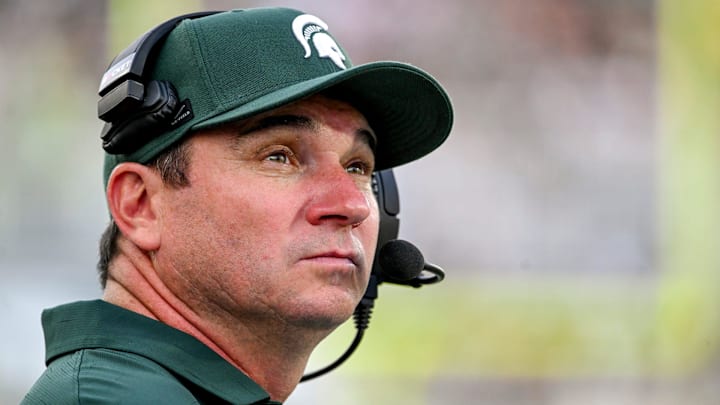Another college football season is right around the corner, and with the new campaign kicking off in a couple of weeks, there are some rule changes to keep an eye on.
That's right, college football came out with a new set of rules heading into the season, and they could end up affecting Michigan State.
Before we dive into how they could affect the Spartans, let's take a look at the new rule changes, according to a press release from the National Football Foundation.
Feigning injuries
This is basically a fight against faking injuries. So if a player presents as injured after the ref spots the ball, his team will be charged a timeout, and he'll have to sit out one down, regardless of whether or not a timeout is called. The player will also need to be cleared by medical personnel in order to return.
Overtime timeouts
This is to speed the overtime process up a bit. Prior to this new rule, each team was allowed a timeout in every single extra period, but now, it's only one timeout per each team in the first two extra periods, and then one more for the remainder of the game -- so if the game goes eight overtimes, each team will have just one timeout to use from the third to the eighth extra period.
Referee replay announcements
Instead of saying a call has been "confirmed" or "stands" when affirming a play won't be overturned, the referee will refer to the call as being "upheld" instead. Small change.
"T" signal on kickoff returns
The "T" signal, which is usually used to alert teammates that a kick won't be returned, is considered invalid, and the returner won't be able to advance the ball after making that sign. Also, no other player on the return team other than the returner may call for a fair catch.
Pre-snap movement on defense
Defenders within a yard of the line of scrimmage are not permitted to make quick, abrupt, or exaggerated movements that could draw the offensive line to false start. The same will go for the offensive side of the ball trying abrupt movements to draw the defense offsides. Basically, movement before the snap will be minimized.
Disconcerting signals
No players can use signals or words that disconcert opponents before the snap and potentially draw them to either false start or jump offsides. The words "move" and "stem" are reportedly only to be used by the defense, and clapping can be used on offense only.
Defensive substitution fouls after 2-minute timeout
If the defense has 12 men on the field after the two-minute timeout, the offense will have the option to reset the clock back to the time of the snap. It will then be restarted on the next snap.
Eye shields
Visors and eye shields have to be clear and approved by officials. We won't be seeing any tinted visors anymore which decreases college football's "cool factor" by about 10 points.
Defenseless player update
Players going for loose balls are now considered "defenseless". This could get tricky to judge.
Unsportsmanlike conduct penalties
All forms of gun violence, whether it's celebrations with hand signals or trash talk, are instant unsportsmanlike penalties. This one is pretty clear-cut.
So how do all of these new rules affect Michigan State? Well, being able to get injury timeouts under two minutes will be tougher because if a player goes down after the ball is spotted, it'll cost the Spartans a timeout and/or a penalty if all timeouts have been used. Faking the offense out with phantom blitzes may be tougher because there can't be any exaggerated movements by defenders within a yard of the line. So no linebackers running up and stomping to try and get the offense to jump.
Other than those two, I think everything seems pretty fair and clear-cut. I'm not a huge fan of the "defenseless player" rule on loose balls because the ref could call a critical penalty while players are fighting to recover a fumble.
We'll see all of these updated rules enforced in 2025.
